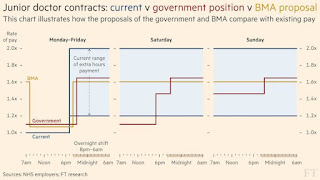I met two dads last night, one a junior doctor picking his daughter up from the same Karate class my son; the other, a consultant, at the pub after a long day (covering for junior doctors). Both of them spoke about the junior doctors strike and some of what they said is mind boggling. How have we come to such a sorry state in the NHS? Are doctors simply overpaid since contracts were changed by Blair and co? Are the managers of the NHS just after balancing a budget with no thought for the impact their decisions might have on other departments? And does Jeremy Hunt deserve to have his name used as Cockney rhyming slang?
This is how the situation was explained to me:
- A BMJ paper in September 2015 showed that patients are 10-15% more likely to die if they are admitted on a weekend. [This work has been criticised as flawed due to the complexities of comparing patients admitted on different days - you may actually be sicker at the weekend. But the paper has an errata as it turned out that one of the authors Bruce Keogh (medical director of NHS England) is "a long standing proponent of improving NHS services seven days a week" why the BMJ should have to "have requested that this be included in the authors’ conflict of interest statement" I don't know - seems obvious to include it to me.]
- Because of this the government in England has decided that NHS services should be available seven days a week.
- They have proposed a new contract for junior doctors that changes the hourly rate they get after 7pm and at the weekends, and they won't get annual pay increments, instead pay progression will be linked to training.
- Junior doctors already work weekends.
- Junior doctors say the new contract will not add new doctors to the system, but it will make them cheaper to pay at the weekend.
- Both parties cannot come to an agreement so junior doctors have gone on strike.
How will pay change: The Financial Times has a nice graphic showing how the current pay structure compares to those proposed by the government or the BMA. And the BBC also have a graphic showing the junior doctors rates for unsocial hours, I used their numbers to try and see how different the positions are and it really did not seem to be worth striking over - I make the BMAs suggestion as cheaper that the governments!?!
 |
| From FT.com |
The aim appears to be to get more doctors working at weekends, and it should make paying them at weekends cheaper than today so money will be saved. But the consultant I spoke to used a single example to show how much waste is happening in the NHS - and that fixing this would have far more impact than changing junior doctors rates of pay.
An example of NHS waste: The consultant described an elderly patient who needed a mental health referral before discharge, however the person who would do this was on holiday for a week, so the consultant's patient has to stay in hospital. This blocks the bed for 7 days at around £400 per night (that's the equivalent of The Goring in London, or The Waldorf Astoria in New York). If 10 patients are in the same situation then the bill for this persons one weeks holiday comes to £28,000 or equivalent to a junior doctors salary...and most people get six weeks holiday in the NHS.
The NHS does wonderful things for the UK but successive governments have seriously messed it up. My wife recently spent time in Addenbrookes and whilst she received adequate care the communication from doctors and nurses was abysmal, the food can not be described using any positive adjectives, and the accommodations are pretty terrible given the cost of the bed for the night. I'd love to sing the praises of the NHS but it does feel like big changes are needed...but I am not suggesting I can come up with any useful ideas!
A few extra things to point out:
ReplyDelete1) The Freemantle et al paper from 2015 included Fridays and Mondays in the bracket of 'weekend'. They also say themselves that "to assume that [the extra deaths] are avoidable would be rash and misleading". This coming from an author whom supports 7 day services.
2) IT IS NOT ABOUT PAY. This is a side matter - no doctor in the right mind would hold a full walkout over their pay, ever.
3) The NHS currently runs on good will. Junior doctors (and many other NHS employees) consistently extra hours beyond what they are paid in order to maintain a safe level of care. To think it would be possible to stretch this system any further shows a total misunderstanding of the NHS. Stretching elective cover over 7 days will not be safe for patients.
4) In the government's own equality impact assessment, they state: "any indirect adverse effect on women is a proportionate means of achieving a legitimate aim". The Equalities Commission watchdog has referred the junior doctors contract to the UN for breaching women's rights and equalities standards, citing it as "potentially illegal".
The NHS needs extra funding. No ifs, no buts. Only extra funding of the current services will improve this failing system.
Writing a personal ethics statement can be a thought-provoking experience. How you write it depends on your target audience. biomedical science resume
ReplyDelete